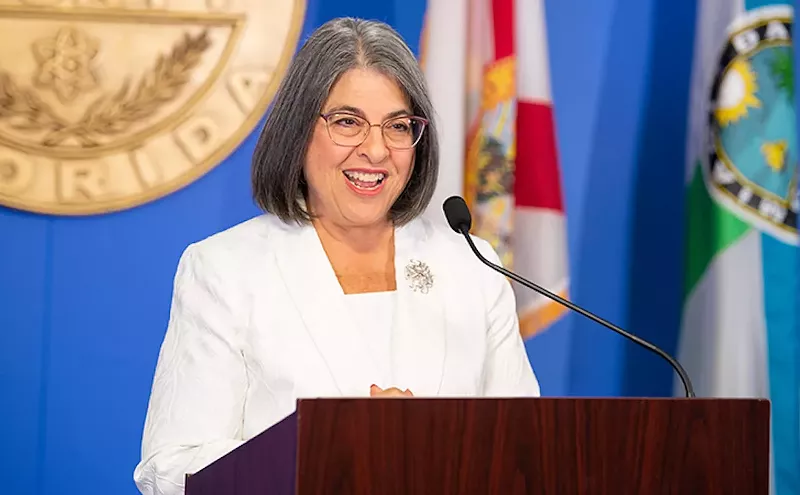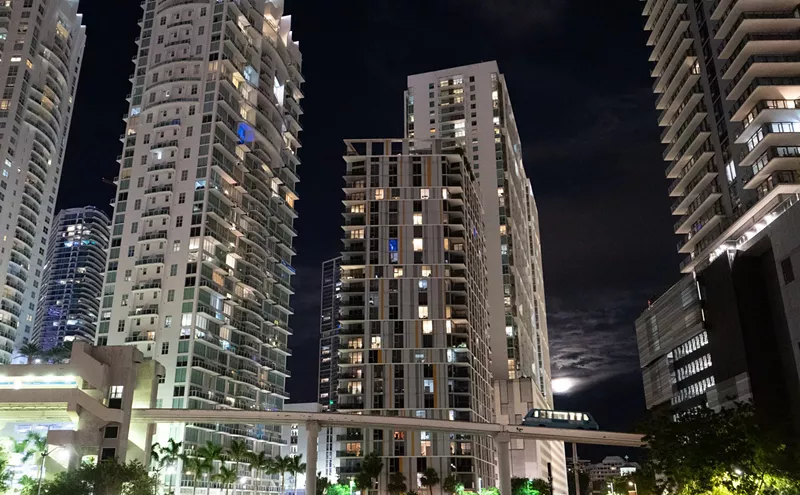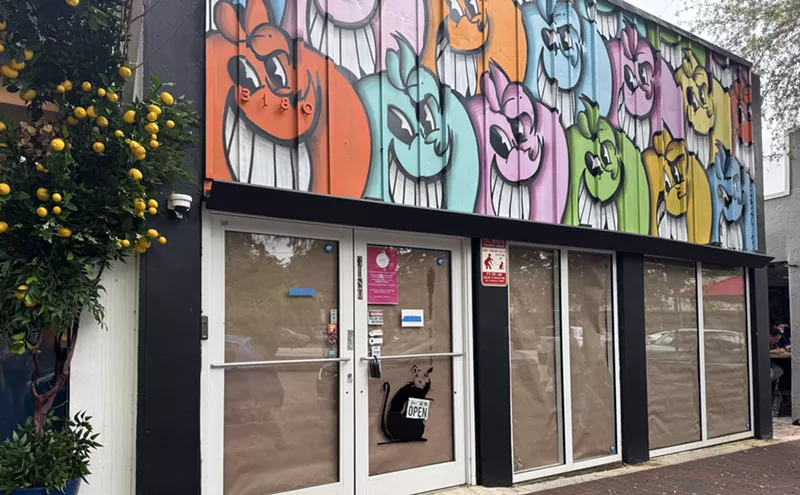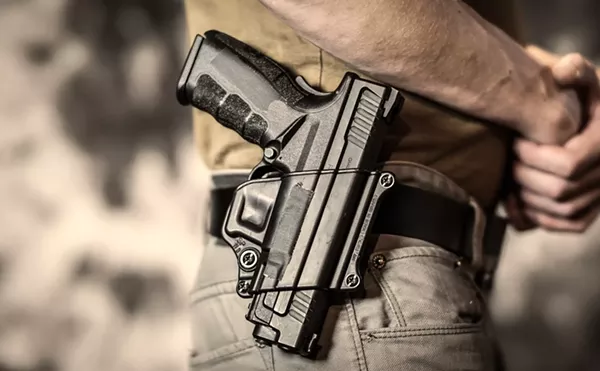Mary Montgomery never saw the black BMW 325i sedan barreling at her. The 71-year-old pedestrian was crossing Harding Avenue in North Beach when she suddenly slammed onto the hood and bounced off the windshield, shattering it. Then she crashed onto the pavement. The Beemer's driver never stopped.
Montgomery died at the scene. It didn't take long for Miami Beach traffic homicide investigators to zero in on a suspect. Fifteen minutes later, they found the wrecked BMW abandoned about a mile from the accident. The vehicle's tag led them to the owner, a drunk 27-year-old Boston native named Sean Casey. He was asleep in his South Beach apartment when three officers knocked on his door at 10:51 a.m.
That was 2001. After bonding out of jail and enduring years of court hearings, Casey — a Georgetown alum and free speech advocate with no prior criminal record — fled to Chile, where he stayed for two years. In 2006, he was deported to the United States. Rather than face trial, he pleaded guilty to vehicular homicide and was sentenced to 12.5 years in prison.
Now, in a last-ditch attempt to escape the state pen, Casey is claiming his lawyer, Milton Hirsch, and a psychologist, Michael Rappaport, lied under oath when they denied counseling him to leave the country. He wants a new trial.
Backing up his claim about Rappaport is a transcript of a secretly recorded conversation among Casey, his mother, and the therapist. "The reality is if he didn't show up in court, nobody is coming looking for him," the therapist is alleged to have said. "They just don't do it."
There is also a transcript of a separate conversation — also covertly taped — that Hirsch had with Casey and his mom. But it's far less convincing. Those transcripts were obtained by New Times this past March and then sealed by the court in May.
"I was tricked," Casey said during a court hearing this past March. "It was like my attorney had given up. He [told] me basically to leave, to flee." Interviewed last week at the Metro West Detention Center in Doral, he added, "If [Rappaport and Hirsch] hadn't scared me into believing that the only way to save myself was to flee, I wouldn't have made my situation worse."
Hirsch, who is running for county judge in 2010, declined to answer specific questions. Instead he provided a written statement: "Casey has accused me of being part of a conspiracy against him. But the simple facts in this case are that Sean Casey is the one who got drunk; the one who brutally killed an innocent old woman; and is the one who fled the scene... Sooner or later, Sean Casey is going to have to accept that."
Rappaport, who has denied he encouraged Casey to run, declined to comment for this story.
Indeed, in 2007, a judge refused to listen to the recordings, which were illegally made, and found Casey's testimony "unworthy of belief."
Whatever the truth, the case provides a fascinating look at what happened backstage in a high-stakes court case.
Casey is a fair-skinned gay man with thinning strawberry blond hair and blue eyes. He speaks in a low monotone voice. An only child, he grew up in a suburb south of Boston. He received a bachelor's degree in foreign service and a master's in Latin American studies from Georgetown University.
At the time he was arrested for DUI manslaughter, Casey was employed as a project administrator for the Inter American Press Association, a Miami-based nonprofit agency that assists journalists and press organizations in Latin America on freedom-of-speech issues. During his four years with the IAPA, Casey traveled to and from several Central and South American countries and the Caribbean. He was supposed to have left for São Paulo, Brazil, a few days after Montgomery was killed.
According to the March 11, 2001 sworn statement Casey gave the cops, he left his South Beach apartment around 1:30 a.m. and headed for a South Miami bar called Ozone, where he had about six drinks. Casey said he left around 5 a.m. for North Miami Beach's Boardwalk bar on Collins Avenue, where he had four rum and Cokes as the sun came up. After that, Casey insisted, he had no idea what happened to him or how he got back to his house. He also claimed an unknown person stole his BMW.
After holding him for more than four hours and obtaining his consent to search his apartment, police arrested Casey for DUI manslaughter. The cops found glass shards from his Beemer's windshield on the clothes he had been wearing. They tested his blood alcohol level, and it registered twice the legal limit.
Following his arrest, Casey immediately hired Hirsch, who eventually decided his client's chances of acquittal were slim, Casey says. On November 11, 2003, Casey alleges the attorney told him: "If I were you or if I could do anything, I would make you disappear... You speak Spanish, you travel a lot, you know prison is not going to be good for you."
On May 12, 2004, Casey met with Hirsch again. Casey's mother, Genevieve, was also present. This was the first meeting that was secretly recorded. Casey and his mom declined to comment about how they obtained the tapes. According to the excerpt, Hirsch told Genevieve: "I wish I could wave my wand and make Sean disappear magically... I wish I could cause him to simply reappear on the planet Vulcan or something like that and be out of harm's way." He added, "I've represented guys who could do prison time standing on their head. Sean is not one."
The next day, Casey and his mother met Rappaport. (Hirsch would later tell the court he often refers "difficult clients" to the psychologist for evaluations.) Casey had been seeing Rappaport for quite awhile. In the transcript of that tape, the psychologist tells Casey and his mother: "Most of the people who leave the country don't get caught... And there aren't DUI gay guys from Miami on Interpol's list."
Then he addresses Genevieve: "I'm telling you if it were my son; I would do everything I could not to get him to go to prison. The reality is staying in this country becomes very problematic. Most of the people who leave the country don't get caught."
Casey didn't reveal the existence of the tapes before agreeing to the plea deal Hirsch negotiated for him in 2006. The next year, though, he hired a new lawyer, David S. Markus, who argued at a March 2, 2007 hearing that the taped conversations were enough to dismiss the DUI manslaughter conviction. Markus wanted the court to start the case over by vacating the guilty plea. At a new trial, he said, Casey would be cleared. And he claimed Hirsch was to blame. "If a lawyer tells his client to flee the jurisdiction, it is aiding and abbetting," Markus told the court. "It's obstruction of justice. I think it's a criminal act."
On the stand, Hirsch and Rappaport vehemently denied they had encouraged or advised Casey to leave the United States. "I didn't tell him to run over Mrs. Montgomery," Hirsch testified. "I didn't tell him to flee the scene. I didn't tell him to flee the country. And I didn't tell him to make up stories."
Judge Leonard Glick, who presided over the case at that time, declined to listen to the tapes after a prosecutor alleged they were illegally made. Under Florida law, it is generally illegal to record someone if they do not know they are being taped. Without that evidence, Glick found Casey's testimony "unworthy of belief."
A new hearing is scheduled July 29. One issue that might come up is a letter indicating Hirsch tried to help Casey stay in Chile. Before he was extradited, Casey hired Chilean lawyer Patricio Gonzalez Marin. On October 25, 2006, he wrote to the State Attorney's Office that "Hirsch understood that the objective of our case was for Mr. Casey not to be deported and obtain legal residence in Chile... In August 2006, to assist our case, Mr. Hirsch sent a certified affidavit to us informing that Mr. Casey was never tried or convicted for the charges against him in the United States."
Casey is not optimistic: "Milton Hirsch has a lot of influence," he says. "I am going up against the establishment."












